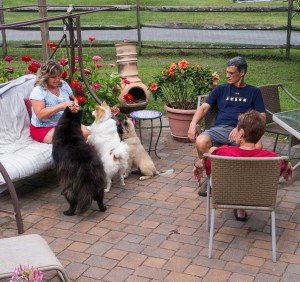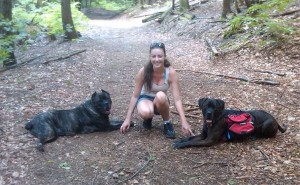We Are Family: Are Your Dogs Family or Pets?
I have always disliked that word “pet”. It implies a relationship of servitude. Such a relationship is unequal in an unpleasant way. The existence of an animal for the sole purpose of the human. That’s not why I share my life with dogs. I want a mutual relationship with my dogs. They get a say in their life. I am their human parent. I am not their master.
One of Merriam-Webster definitions of pet when used as a noun is as follows: a domesticated animal kept for pleasure rather than utility. Further google searches for additional definitions might include the notation that the affection is typically returned by the “pet” to the owner. How generous of that statement as an afterthought! Choosing to share our life with dogs should mean that the pleasure of both parties is of importance as a standard.
I asked this question on the How Many Dogs Facebook page: are your dogs pets or family? I did not calculate exact percentages from the responses so this is only a guess, but approximately 98% said family without question. Some even questioned as to whether I was serious in even asking such a question. Obviously, the majority of that audience is not who I have to convince.
The concept of dogs as family is not easy for some to wrap their heads around. Old traditions die hard. The traditional role of animals in the life of humans placed the humans in what was once referred to as an alpha role. That perception of our role in a dog’s life has been disproved by science. There are plenty of people still willing to cling to that role, however. Inaccurate information presented on unfortunately widely available TV shows contribute to antiquated information maintaining a place in the public eye. This also contributes to the unbalanced relationships that many people have with their dogs.
In human families, those who are closest emotionally are not always related by blood. Close friends are often considered family and non-traditional nuclear families are more common than traditional ones (with parents who are on their first marriage to one another with only shared children in the home). Blended families are far more common in this modern day and age.
Dogs are part of a blended family. You choose them. Unlike blood relatives, you have made the decision to add an animal to your home. In multiple dog households, that concept is even more front and center. A cohesive household should be your goal. There are always going to be spats in a family. Love doesn’t prevent other emotions. Conflict is part of life. Your goal as a dog parent is to minimize that potential. Be the parental figure. You can read more about that subject by clicking here.
There are hundreds of multiple dog households with dogs who don’t get along. It happens, but this is not the scenario that this article is about. I don’t judge households like this as inappropriate. Keeping the conflict to a minimum and keeping everyone safe should be a goal in such households. How do you create a more cohesive family if your current crew is unstable? An article’s recommendation can only deal in generalizations. The number one answer is get a professional behavior consultant to help you. Failing that, be a strong but kind parental type figure who creates boundaries and is observant and is present for all questions and answers. Provide the information that is relevant, provide training for all dogs who need it, provide safety as well as all the other basic needs.
Families celebrate each other’s successes and share each other’s pain. Families stick together when it counts. Families have fun together. Families mourn losses. If your crew is happiest when everyone is together, then you have succeeded in creating a family. If your dogs greet each other after one or more having been separated for one reason or another, then you have a family. If your dogs look out for each other in some way in some scenarios and have jealous spats in other circumstances, then you have a family. Pat yourself on the back, hug your dogs (if they enjoy that!) and celebrate your family. Give them the courtesy of calling them family rather than pets. I personally use the word dogs rather than pets when applicable. I am the human, they are the dogs. Together we are a family. No pets here.
Feel free to share your thoughts on this subject in the spaces below.
Posted in: Projects
Leave a Comment (8) →



